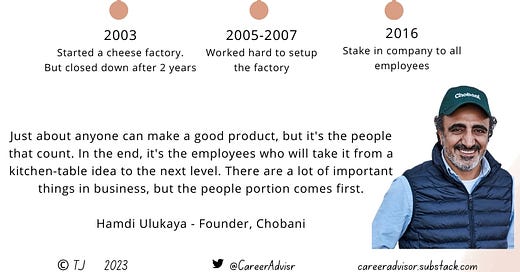People centric leadership with Hamdi Ulukaya, CEO of Chobani
Businesses have the super power to make the world a better place - for all the people.
Tell me in a sentence
Businesses have the superpower to make the world a better place - for all the people. Employees and customers come first in a people-centric business.
Tell me in an image
"Hamdi Ulukaya 2017" by Chobani is licensed under CC BY-SA 3.0.
Tell me more
Mr. Ulukaya is proof that the American dream is still alive. He is an immigrant from Turkey and went on to start Chobani which did more than 1.5 billion in sales in 20221. He did this without taking investor money, which means no outside party owns equity in Chobani. But if you listen to his interviews, you will quickly find that he is not a typical founder. He does not have a business background, and his approach to business is very people-centric, not profit-centric.
Ulukaya moved to the US in 1994 and started a cheese factory in 2003. He talks about working very hard at the cheese factory for about 2 years, without success. In 2005, he bought a yogurt factory - not only because it was a bargain for $700K, but also because he felt a need to help the people who would lose their job if the factory was shut.
He felt that the people who worked in the factory were wronged by the CEO who made decisions based on numbers in a spreadsheet2.
Ulukaya talks about how his first task was to paint the walls white - not because he wanted to make a statement but because that is the only thing he could think of.
He was not in a hurry to ‘make it’.
But he knew he had one shot to do it right. Ulukaya was passionate about making good food available at accessible prices. He started to work with a yogurt master3 to test out recipes.
His attention to detail is notable.
He wanted 9mm plastic cups for his yogurt but could not get a vendor to make it for him in the US. He also wanted the cups to have colorful sleeves. So, he ended up traveling to Columbia to meet with a vendor - who eventually ended up supplying the cups for 2 years.
He is a creative problem solver.
Since he did not have the money to pay for the slotting fees4 at the Long Island grocery store where Chobani first went on sale, he offered to pay as they sell the yogurt. “What if the yogurt does not sell?”, asked the buyer. Ulukaya offered to sell him the yogurt factory5 if that happens. One week later, the buyer called to tell him that the yogurt is selling fast.
Ulukaya is ready to work hard
He realized quickly that selling would be easier than actually making the yogurt. To lead the scale-up, he stayed near the factory for the next 5 years. He talks about how he did not know anything that happened in the outside world during that 2007-2012 time period. He was single-mindedly focused on increasing production.
He is a believer in paying it forward and in the power of community
Once Chobani started making money, Ulukaya had a chance to build a baseball field for the kids in the community. Not only did he complete the field in 2010, but he also corralled the community to support it - every step of the way.
In 2016, he launched Tent, a non-profit that helps refugees get integrated into communities. It currently has 300 companies in the network.
Ulukaya is passionate about making good nutritious food that is reasonably priced. While Chobani has expanded to other items like creamer, he is eager to welcome new companies to support the mission. He launched the Chobani incubator in 2016 which has supported 47 companies to date.
Ulukaya is building a people-focused business, not just a shareholder-focused one.
Ulukaya operates his business with employees and customers as the key stakeholders. In 2016, he announced that 10% of Chobani will be distributed to the employees. He has been a proponent of paying employees fairly and offering them benefits like paid parental leave.
When asked about tips for immigrants starting businesses in the US, Ulukaya gave two tips.
Get to know the US, beyond the stereotypes. Ulukaya wanted to understand if the typical US customer would buy his not-so-sweet yogurt. He would go to specialty stores and talk to people who bought greek yogurt to understand their propensity to buy what he was making. He also talks about how he is very comfortable working with the people in the conservative regions of the US while upholding liberal values as a company. He attributes this to building connections with people.
Do not forget your roots, and use them as tools for your advantage. This makes sense coming from Ulukaya who operated a dairy farm in Turkey, and then went on to build a successful yogurt company in the US6.
Building a business with a heart is possible and Hamdi Ulukaya has built one. Go ahead and build a people-centric team or maybe even an entire company.
I have mixed feelings here. On one hand, I feel businesses are expected to let people go when it makes business sense. On the other hand, I don’t like being let go!
I did not know that Yogurt master was a thing.
A slotting fee is a one-time cost that manufacturers pay to place their products on retail shelves.
If this is not betting the farm, I don’t know what is.
References - Interview at Stanford, HBR interview, Summit interview, Wikipedia




